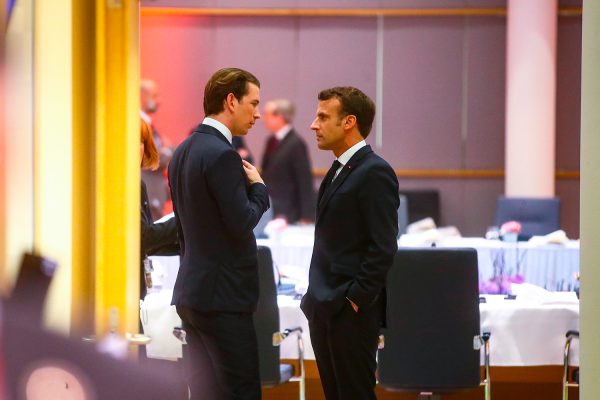
French president Emmanuel Macron has startled observers with a number of policies that might seem to contradict his previously held beliefs.
Despite being pro-EU, he blocked membership talks with Albania and North Macedonia. Once clear-eyed on the Russian threat, Macron now argues for dialogue with Moscow and calls Islamic terror NATO’s number-one enemy. He even made a point of attacking political Islam.
Some hear dog whistles to the far right, assume bad faith and call Macron an Islamophobe. That is unfair to the most liberal president France has had since Valéry Giscard d’Estaing.
Western Balkans
Portugal’s Bruno Maçães, a former junior minister for Europe and now a senior fellow at the Hudson Institute in America, believes Macron vetoed EU accession talks with the Western Balkan states because they have large Muslim populations.
The reason Macron gave is that he wants the accession process to be reformed. He’s not alone. France took the heat, but the Netherlands and EU members in Scandinavia weren’t wild about Albania and North Macedonia joining either. Support for the EU as a whole is up since the euro crisis, but EU enlargement remains unpopular. (Eurobarometer puts EU-wide support for enlargement at 44 percent, but in all the countries of Western Europe, except Spain, support is lower.)
Macron’s priority since the beginning of his presidency has been EU reform. That is the more likely motivation behind his veto.
I agree the EU was wrong to break its promise to Albania and North Macedonia, which have both done a lot to qualify for the opening of negotiations. But the average European doesn’t know that. They see more countries they know little about, stereotyped by Euroskeptics as backward and corrupt, knocking on Europe’s door, and a Europe that might let them in despite their doubts.
If it did, it could undermine support for the EU as a whole and jeopardize Macron’s reform agenda, which includes closer defense cooperation, a common border force, a eurozone budget and a European Climate Bank to finance the transition to a green economy.
Enemy
Macron caused another stir this week, when he called Islamic terrorism, not Russia, NATO’s enemy.
Tom Wright, a senior fellow at the Brookings Institution, calls it the “George W. Bush foreign policy”.
Wright and I agree Russia poses a more strategic threat to Europe. But it’s not hard to see where Macron is coming from.
Since he became president, there have been six terrorist attacks in France, five carried out by radical Islamists, in which fifteen people were killed, and one by a right-wing extremist against a mosque, in which two people were injured but no one died.
Two years earlier, in 2015, 130 people were killed by Muslim terrorists in Paris. It were the deadliest attacks on French soil since World War II.
34 French soldiers have been killed, and sixty wounded, in battles with militant Islamists in Burkina Faso, Chad, Mali, Mauritania and Niger since 2014. Thirteen were killed in Mali this week.
That was the context of Macron’s remarks.
He also said, “In the Sahel, France is involved and acting on behalf of everyone.” He called on other NATO states to help and maintained that the “absence of dialogue with Russia” hadn’t made Europe “any safer.”
Reasonable people can disagree. I’m not sure what dialogue with Russia would accomplish at this point other than normalize its behavior. But reading those words and concluding that Macron must be motivated by Islamophobia does not seem reasonable.
Values
Mehreen Khan, the Brussels correspondent of the Financial Times, has gone so far as to compare Macron to white nationalist Steve Bannon and illiberal strongmen Narendra Modi, Vladimir Putin and Donald Trump.
You’d imagine Macron must have said something outrageous — and perhaps according to Khan this is — but what aggravated her was Macron’s statement that political Islam is not compatible with “European humanist values, which are based on the free and rational individual, equality between women and men, and emancipation.”
You don’t need to be a white nationalist to agree with that.
Political Islam, insofar as it argues for the supremacy of religious over secular law, is incompatible with liberal European values. Islamic fundamentalism, insofar as it denies the equality of men and women, gay and straight, and rejects an equal sphere to itself for other religions, is incompatible with humanist European values.
Again, reasonable people can disagree if the liberal, humanist thing to do is allow the burqa (because women should wear what they want) or ban it (because women should wear what they want and the burqa is an instrument of women’s oppression). Reasonable people can disagree if the liberal, humanist thing to do is restrict immigration (to avoid malintegration and a backlash) or expand it (because free people should be able to live anywhere and aging Europe needs more workers).
These aren’t easy questions for liberals. At least they aren’t for me. Even if they are for Khan, it’s poor analysis to not even consider the possibility — and I would argue likelihood — that Macron is trying to reconcile different liberal values, without leaving the conservative half of France behind, when he has been reliably liberal so far.
